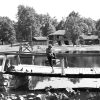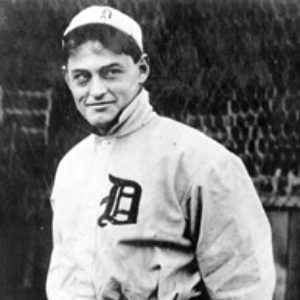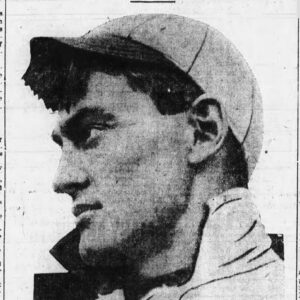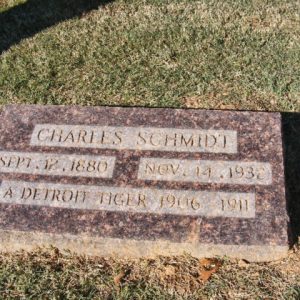calsfoundation@cals.org
Charles "Boss" Schmidt (1880–1932)
Arkansas native Charles “Boss” Schmidt was a baseball player whose minor and major league career spanned most of the first two decades of the twentieth century. His nickname was a tribute to the toughness he exhibited, especially in fights during his baseball career (with other ballplayers, including his Detroit Tigers teammate Ty Cobb) and during a brief stint as a boxer.
Charles Schmidt was born on September 12, 1880, in London (Pope County)—some sources say Coal Hill (Johnson County)—to German immigrants John and Mary Schmidt. It is unclear how many siblings he had, but a younger brother, Walter, played professional baseball with the Pittsburgh Pirates. As a youth, Schmidt worked in the coal mines central to the region’s economy. While this type of work did much to develop his strength, Schmidt wanted to escape the mines. In 1901, he began his career in professional baseball, catching for a semi-professional team in Fort Smith (Sebastian County).
In 1902, Schmidt joined the Springfield Reds and later the Springfield Midgets, both of the Class D Missouri Valley League. In 1903, Schmidt had a brief stay with the Class B Rock Island Islanders, but otherwise he spent three years with Springfield before being sent to the Minneapolis Millers in the Class A American Association at the end of 1904. His work in Minneapolis impressed Tiger scouts, who needed a quality catcher and were particularly interested in his strong arm. At the end of the 1905 season, they signed him.
Schmidt played in sixty-eight games his rookie season. A switch hitter, he struggled against left-handed pitching and was often “platooned” (played in rotation). He was bothered by ankle trouble, but when mid-season X-rays revealed a broken bone, Schmidt put off the suggested surgery, continuing to play for a team that finished under .500 and was beset by internal turmoil.
The 1907 season was different. Schmidt had undergone off-season surgery, and the early season included a pair of major fights between Schmidt and the legendary Ty Cobb—brawls in which by all accounts the hard-bitten catcher got the better of the future Hall of Fame member. Harmony ultimately prevailed, however, and the Tigers won the American League pennant.
Schmidt shared the catching duties during the 1907 season, appearing in 104 games while hitting .244. While he led all catchers in errors, he was third in throwing out runners stealing bases. In the 1907 World Series against the Chicago Cubs, the Tigers were outmanned, losing four games in a row after the opener was called a tie due to darkness. Schmidt caught three of the five games.
The Tigers successfully defended their American League crown in 1908, and Schmidt had his best year offensively, hitting .265, with 111 hits, forty-five runs, and thirty-eight runs batted in over 122 games. The World Series, a rematch between the Tigers and the Cubs, resulted in another Cubs victory. Adding to his misery, for the second year in a row, he made the final out of the series, becoming the only player in World Series history to make the final out in two consecutive series.
In 1909, Schmidt again shared the catching duties, appearing in eighty-one games as his batting average dropped to .209. Again the American League champs, the Tigers faced the Pittsburgh Pirates this time, but the result was again defeat, 4–3. The series was a personal low point for Schmidt, who made five errors, still the record for the most errors by a single player in a series, while also allowing sixteen stolen bases. By 1910, Schmidt had been relegated to backup, hitting .259 in only seventy-one games for a team that finished third.
Schmidt, unhappy with baseball, did some professional boxing during the off season; legend has it that he sparred with former heavyweight champion Jack Johnson, but there is no definite evidence of this. Sporting a bad arm, Schmidt saw little action in 1911, and he returned to the minors in 1912.
Overall, Schmidt played catcher for the Detroit Tigers for six seasons, from 1906 through 1911. He compiled a career batting average of .243 with 360 hits, 137 runs, and 124 runs batted in over 477 games, and he played in three World Series.
Following his final season with the Tigers, Schmidt bounced around the minors, trying to stay in baseball. He played his final game in 1924 with Springfield, a C-level ball club. For most of his minor league tenure, he was in Class A, and for a number of those years, he also served as a player manager, leading the Mobile Sea Gulls in 1915 and 1916, and the Fort Smith Twins in 1920 and 1921.
In 1923, he returned to the major leagues, serving as a coach of the Brooklyn Robins; a forerunner of the Dodgers, the team was named for its manager Wilbert Robinson. He also led the Kalamazoo minor league squad in 1926 and the Quincy team in 1927. Schmidt even did a brief stint as an umpire while continuing to seek jobs with teams at any level. He coached with the Tigers for half a season in 1929, and he tried a comeback a couple years later with a Detroit-area industrial team.
All the while, his personal life was unraveling. Suffering from alcoholism, he went bankrupt soon after his major league career ended, and his wife, Minnie Moore—with whom he had a son and daughter—left him and moved to California.
Impoverished and in ill health, Schmidt died in Clarksville (Johnson County) on November 14, 1932, and was buried in an unmarked grave in St. Mary’s Cemetery in Altus (Franklin County). In 1969, a group of Altus citizens alerted the Tigers to his anonymous status, and they placed a simple but stately headstone there in early 1970. Below his name and birth and death dates, it reads “A Detroit Tiger 1906–1911.”
For additional information:
“Boss Schmidt.” Baseball-Reference.com. http://www.baseball-reference.com/players/s/schmibo01.shtml (accessed November 16, 2020).
“Boss Schmidt (Minors).” Baseball-Reference.com. http://www.baseball-reference.com/minors/player.cgi?id=schmid001cha (accessed November 16, 2020).
Williams, Phil. “Boss Schmidt.” Society for American Baseball Research. http://sabr.org/bioproj/person/b252f8b9 (accessed November 16, 2020).
William H. Pruden III
Ravenscroft School
 Early Twentieth Century, 1901 through 1940
Early Twentieth Century, 1901 through 1940 Recreation and Sports
Recreation and Sports Charles Schmidt
Charles Schmidt  "Boss" Schmidt Article
"Boss" Schmidt Article  Charles Schmidt Headstone
Charles Schmidt Headstone 




Comments
No comments on this entry yet.